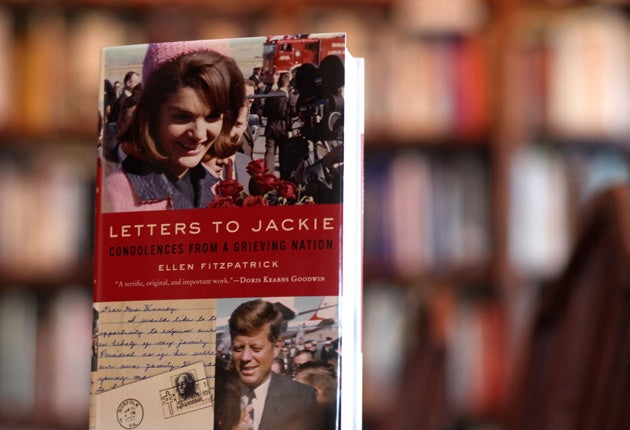Dear Jackie... how America mourned JFK

Your support helps us to tell the story
From reproductive rights to climate change to Big Tech, The Independent is on the ground when the story is developing. Whether it's investigating the financials of Elon Musk's pro-Trump PAC or producing our latest documentary, 'The A Word', which shines a light on the American women fighting for reproductive rights, we know how important it is to parse out the facts from the messaging.
At such a critical moment in US history, we need reporters on the ground. Your donation allows us to keep sending journalists to speak to both sides of the story.
The Independent is trusted by Americans across the entire political spectrum. And unlike many other quality news outlets, we choose not to lock Americans out of our reporting and analysis with paywalls. We believe quality journalism should be available to everyone, paid for by those who can afford it.
Your support makes all the difference.They arrived from every corner of the country. They were from men women and children, of every race, age, class and calling. Half a century on, they have come to life again, expressing Americans' grief, shock and collective sense of bereavement at the news of John F Kennedy's assassination.
Letters to Jackie, a book by the historian Ellen Fitzpatrick that has just been published, contains only a tiny sample of the tidal wave of sympathy and sorrow that Americans directed towards the late president's widow.
"I'm just an average American," wrote Marilyn Davenport of New York, "...but I will always have a warm spot in my heart for both of you as long as I live." Another of the 250 letters in the book grappled with the enormity of what had happened: "In two seconds, history's course was changed," a young man wrote. "The irrationality of life will never be more clearly set down for us. I grieve for John Fitzgerald Kennedy."
The President died on the afternoon of Friday 22 November 1963. By Monday, 45,000 letters had arrived at the White House. Within a week, an estimated 250,000 more arrived at the family home in Massachusetts.
Schoolgirl Jane Dryden, 11, was among the most dogged, churning out a letter a week for six months straight. By mid-January 1964, when Jackie made a brief television appearance to thank the American people for their support, she had received 800,000 letters. "Whenever I can bear to, I read them," she said. After two years the number of letters exceeded 1.5 million.
Most who wrote received a black-bordered note card in return, bearing the family coat of arms of three gold helmets, and the message that "Mrs Kennedy is deeply appreciative of your sympathy and grateful for your kindness."
If stored in their entirety the letters would have filled a quarter of a mile of shelves, and inevitably most were destroyed. But 200,000 were sent to JFK's Presidential Library in Boston, where for decades they stayed virtually undisturbed until Ms Fitzpatrick found them.
On Thursday, she returns to the scene of the crime for a book-signing in Dallas, at the Sixth Floor museum at Dealey Plaza, complete with the window from which Lee Harvey Oswald fired the fatal shots. Today, after nearly 47 years, the impact of the assassination on Dallas has faded. For some of the population at the time however, it was too much to bear.
"Today my heart is SO HEAVY I feel I must express myself to you," one Robert Wood wrote to Jackie on November 22, 1963. I must tell you how VERY ASHAMED I am to be living in this city ... God would I could move from this place this hour."
Join our commenting forum
Join thought-provoking conversations, follow other Independent readers and see their replies
Comments